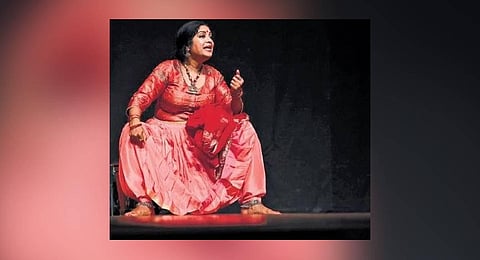

HYDERABAD: Sutradhar recently staged a solo act, titled, ‘Dushala’ at Ravindra Bharathi. The 60-minute act portrayed the narrative of Dushala--the only daughter of Dhritarashtra and Gandhari--in her voice and incorporated elements from Kuchipudi to enhance the theatrical expression of her story. Dushala as a woman, represents all women whose existence was overshadowed by their traditional roles as wives, mothers, sisters, and daughters.
The script for the performance was adapted into Hindi by Sutradhar from Pritham K Chakaravarthy’s Tamil write-up about the character of Dushala. The act was performed by Kuchipudi dancer Dr Alekhya Punjala and directed by Vinay Varma.
Having been neglected by her mother since birth, Dushala expresses her never-ending suffering, which also leads her to develop a sense of moral judgement that sets her apart as a force for good amidst the surrounding evil. She condemns the atrocities committed by her brothers and expresses happiness at the victory of the Pandavas. She also empathises with the disgrace faced by Draupadi during the disrobing incident, to the extent that she can feel Draupadi’s pain and humiliation in her own body.
She is disappointed by her fate, having been neglected throughout her life. This neglect prompts her to yearn for her own identity. She was betrayed by her brother, who traded her to Jayadrath as a consolation for losing at Draupadi’s swayamvar. In contrast to her own experience with her mother, she spends quality time with her child, engaging in activities like picking flowers and chasing butterflies. This builds a foundation for a human bond that was abjected in the case of her relationship with her mother, who, she says, only cared for her 100 sons and their well-being.
Her lament about giving birth to a son once again posits personal relationships and a woman’s identity at the centre of war. It underscores the contrast between the masculine drive to pursue war and the feminine instinct to create and nurture life.
Her moral judgement that could see the futility of the war could not prevent the actual war. Almost as if she could foresee the inevitable defeat of the Kauravas, she grieved at the widespread death the war caused and questioned it with the phrase Vichitra Mahabharata.
Through these words not only does she question the relevance of a great war but also criticises the irrationality of those participating. These are also the words that bring the character Dushala and the performer together, the futility and stupidity of the war exasperates them both.
However, in the climax of the performance, she severs her bond with Hastinapur, not because someone finally begins to understand her, but because she realises her own desire for, or perhaps her anticipation of, being greeted and loved by her mother. The consequences of the war dissipate that desire and her connection with Hastinapur.
The solo act received thunderous applause, and the performer, Alekhya, received a standing ovation from the audience. Director of the play and founder of Sutradhar, Vinay Varma thanked Trishna Kuchipudi Dance Academy and the Department of Language and Culture, Government of Telangana for extending their support to the group.